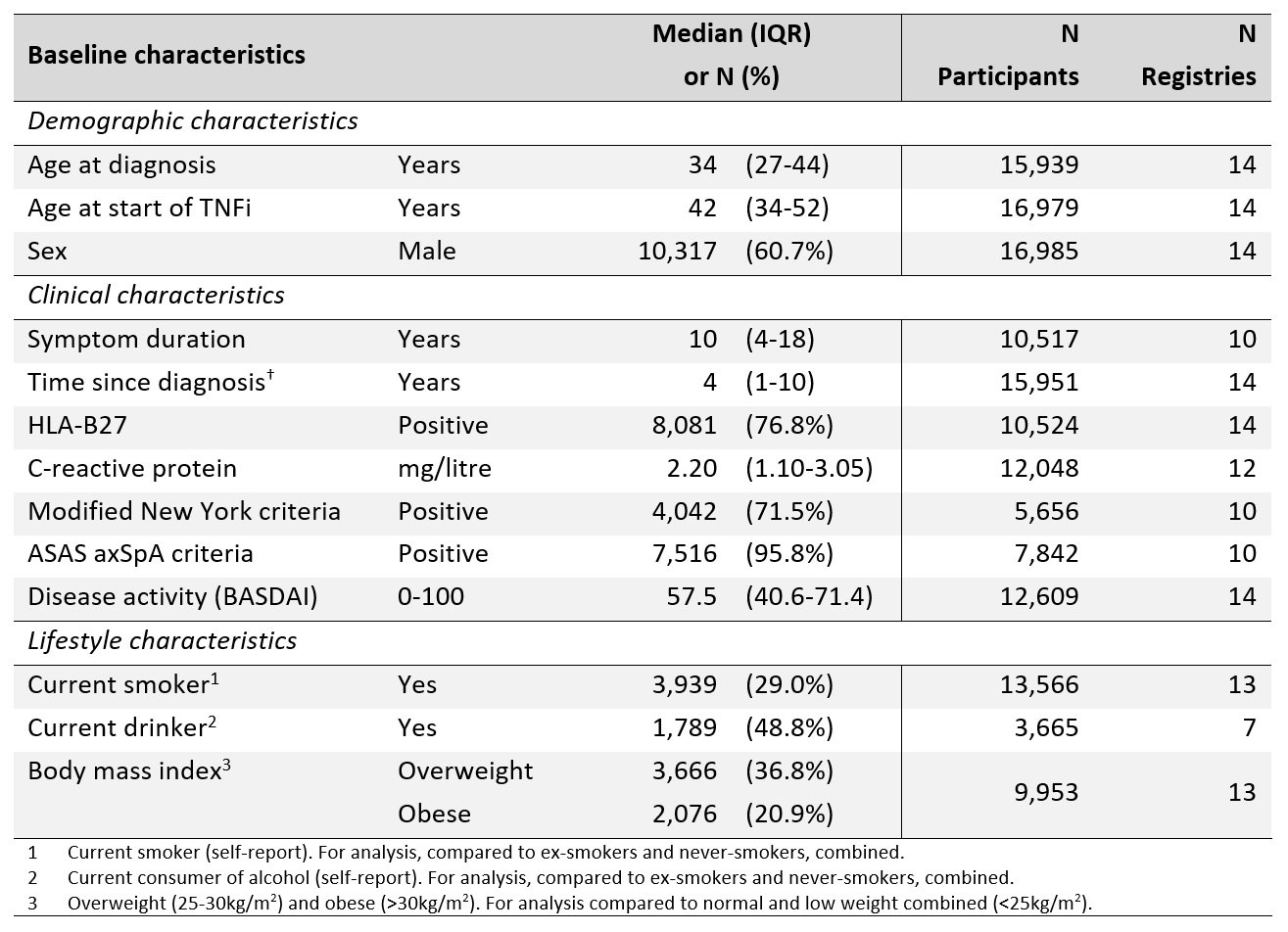Session Information
Date: Sunday, November 13, 2022
Title: Spondyloarthritis Including PsA – Diagnosis, Manifestations, and Outcomes Poster III
Session Type: Poster Session C
Session Time: 1:00PM-3:00PM
Background/Purpose: In axial spondyloarthritis (axSpA) much attention has been focused on pharmacological management, including tumour necrosis factor inhibitors (TNFi), as a means to reducing inflammation, and improving function and quality of life. However studies have demonstrated that even with successful control of inflammation symptoms such as pain and fatigue, which have an important impact on quality of life, can remain. The addition of non-pharmacological therapy, including the modification of adverse lifestyle factors, may offer the potential to enhance treatment outcomes in axial spondyloarthritis (axSpA).
Aim: to quantify the impact of lifestyle factors on TNFi treatment response in axSpA.
Methods: Adult axSpA patients commencing their first TNFi treatment were identified via the European Spondyloarthritis Research Collaboration Network (https://eurospa.eu). Participants were required to have information on lifestyle factors (cigarette smoking, alcohol consumption, and/or BMI) recorded within ±30 days of commencing TNFi (baseline), and have outcome data (BASDAI-50 response) at 12 months. The relationship between lifestyle factors and treatment outcome was assessed using logistic regression, and presented as odds ratios, adjusted for age, sex, country, year of TNFi initiation, disease duration and baseline disease activity (BASDAI). The analysis was then repeated for other response criteria (ASDAS inactive disease, low disease activity, clinically important improvement, and major improvement – namely, ASAS-20, ASAS-40, and ASAS-5/6 improvement).
Results: 16,696 participants were included, from 14 axSpA registries across Europe. 29% were current smokers, 49% current drinkers, 37% were overweight and 21% were obese. Other baseline characteristics are shown in Table 1.
Among smokers, 50% met BASDAI-50 response criteria at 12 months, compared to 54% of non-smokers, an association that remained after adjusting for potential confounders (OR: 0.77; 0.68-0.86). Participants who were obese or overweight were less likely to achieve BASDAI-50, compared to patients of normal weight (44%, 53% and 60% respectively) (OR: 0.53; 0.45-0.63 for obese, and 0.76; 0.66-0.87 for overweight). Similar results were seen for other outcome measures and were robust to additional statistical adjustment for other clinical characteristics. Patients who currently drank alcohol were slightly more likely to respond to treatment (BASDAI-50 45% versus 43%; OR: 1.47; 1.16-1.88) an association that was evident across all outcome measures.
Conclusion: Smoking and high BMI were associated with substantial decreases in the odds of TNFi response. For example: if 100 patients were able to give up smoking when commencing TNFi, an additional eight would achieve BASDAI-50 at 12 months. Rheumatologists should consider appropriate smoking cessation and/or weight management interventions at the time of commencing therapy which may offer the potential to improve outcomes.
The relationship between alcohol consumption and increased response to therapy is unlikely to be causal, and the precise nature of this association warrants further investigation.
To cite this abstract in AMA style:
Jones G, Rotariu O, Michelsen B, Glintborg B, Gudbjornsson B, Geirsson A, Relas H, Isomäki P, Závada J, Pavelka K, Rotar Z, Tomsic M, Nissen M, Ciurea A, Codreanu C, Karlsson Wallman J, Kristianslund E, Rasmussen S, Ørnbjerg L, Santos M, Østergaard M, Hetland M, Macfarlane G. Modifying Lifestyle Factors May Offer the Potential to Enhance the Outcome of Tumour Necrosis Factor Inhibitors in Axial Spondyloarthritis – Data from 14 European Countries [abstract]. Arthritis Rheumatol. 2022; 74 (suppl 9). https://acrabstracts.org/abstract/modifying-lifestyle-factors-may-offer-the-potential-to-enhance-the-outcome-of-tumour-necrosis-factor-inhibitors-in-axial-spondyloarthritis-data-from-14-european-countries/. Accessed .« Back to ACR Convergence 2022
ACR Meeting Abstracts - https://acrabstracts.org/abstract/modifying-lifestyle-factors-may-offer-the-potential-to-enhance-the-outcome-of-tumour-necrosis-factor-inhibitors-in-axial-spondyloarthritis-data-from-14-european-countries/

